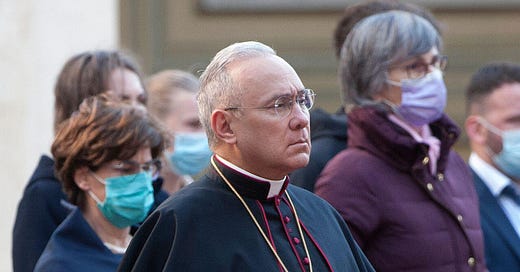
Report: New allegations of spying in Vatican financial scandal
News: Vatican finances
The second-ranking officials at the Vatican Secretariat of State engaged Italian intelligence officers to sweep his Vatican offices for bugs, a former official at the department told Vatican prosecutors.
Archbishop Edgar Peña Parra, who is sostituto at the Secretariat of State, along with Msgr. Mauro Carlino, asked Italian intelligence officials to examine their offices and phones for electronic surveillance, and requested information on individuals who were “trying to break into the economic structures of the Holy See with malicious intent,” according to newly-reported testimony in the Vatican’s financial crimes investigation.
The testimony reportedly comes from Vincenzo Mauriello, a former lay official in the Secretariat of State’s protocol office who reportedly helped connect Peña Parra with an Italian intelligence agent, according to a Feb. 9 report from the Italian news site ADN Kronos.
Mauriello told Vatican investigators that during a meeting in May or June 2019, Peña Parra told him that he wanted to have his new offices swept for bugs, because he discovered that elements of his private conversations he had had were regularly becoming known around the Vatican.
In response, Mauriello reportedly told the archbishop that he knew a suitable person who could carry out a sweep — an officer he knew at the Italian Internal Information and Security Agency (AISI), who was “a practicing Catholic,” the former official testified.
Mauriello claims that after making the introduction, he escorted the intelligence officer, who is not named in the ADN Kronos report, to Peña Parra’s office, and then left him in the company of Carlino to carry out the sweep. He returned two hours later to escort the officer out of the building, Mauriello told investigators.
It is unclear why Peña Parra would have elected to use an Italian intelligence officer to secure his offices, instead of the Vatican’s own gendarmes, or federal police, who have considerable expertise in electronic surveillance.
On a second occasion, Mauriello says, he brought the officer and his superior into another meeting with the sostituto and Carlino, during which they discussed conducting “reconnaissance” for the secretariat on certain individuals.
“I was not told the names of these people,” Mauriello told investigators, “nor did I ask for them since they are not a matter of my competence." But, he said he did point out to the two officials after the meeting, that Peña Parra “can be compared to a Minister for the Interior, and that if he had asked for information it was for the good of the Holy See, and, in any case, within the sphere of his powers.”
When the officers returned to the secretariat several weeks later to present a preliminary report, Mauriello said they were detained by the Vatican City gendarmes, who demanded to know who they were. Although Carlino and Maurello intervened, and brought the agents to their meeting with Peña Parra, the incident resulted in a formal police report.
Some weeks later, Carlino asked Mauriello to put him back in contact with the Italian intelligence officer, because he feared his mobile phone had been hacked.
According to the ADN Kornos report, Mauriello provided his narrative to prosecutors in a written statement in October 2019, shortly after he was suspended from his job at the secretariat. Maurello’s suspension came after Vatican police raided secretariat offices and the offices of the Vatican’s internal financial watchdog, the AIF.
Mauriello repeated the same account during an interview with investigators in January 2020. Italian intelligence authorities have denied Maurello’s account, calling his narrative “baseless.”
News of Mauriello’s account is the latest in a series of leaks of evidence gathered in the course of a nearly two-year investigation in the secretariat’s financial affairs. That investigation led, in July last year, to the charging of ten individuals connected to the secretariat with a range of financial crimes — including Msgr. Carlino and Cardinal Angelo Becciu.
Peña Parra became sostituto in 2018, replacing Becciu, who had held the office for nearly a decade.
In the last few months, as Vatican judges have signaled their growing impatience to proceed to the evidentiary phase of the trial, a series of reports have appeared in Italian media detailing excerpts from evidence gathered from several different witnesses, including previous accounts of alleged spying and counter-espionage efforts by Carlino and Peña Parra, and contact with Italian intelligence.
Torzi has been charged with extortion, money laundering, and fraud by the Vatican.
Capaldo also told prosecutors that he put Carlino in touch with an “IT security expert” to help him with concerns that his mobile phone was being monitored, possibly by Vatican authorities.
At the same time, it also emerged that Marco Simeon, a layman known in the Italian press as “Becciu’s lobbyist” because of his ties to the disgraced cardinal, told prosecutors that a contact of his in Italian intelligence had warned him that Torzi had approached officers asking for information about Becciu and others affiliated with the Secretariat of State, all of whom have subsequently been charged by the Vatican.
The trial in Vatican City is set to resume Feb. 18.





